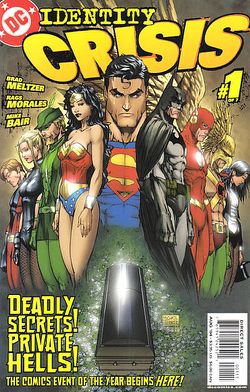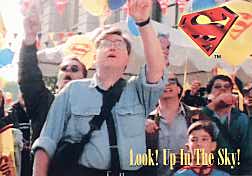Interviews
Exclusive Brad Meltzer "Identity Crisis" Interview
[Date: January 25, 2005]Superman Homepage writer Barry M. Freiman conducted the following interview with writer Brad Meltzer on the huge DC Comics hit "Identity Crisis"...
 Q: Was Identity Crisis a story designed to introduce a sense of "maturity" into the Bronze age or be a good mystery story or both, and if so, how successful do you think you were in conveying those messages with the series?
Q: Was Identity Crisis a story designed to introduce a sense of "maturity" into the Bronze age or be a good mystery story or both, and if so, how successful do you think you were in conveying those messages with the series?
A: Of course both, but let me clarify on the word "maturity." To me, Identity Crisis was a tragedy first and foremost. It's not singularly about "realism" or "maturity" -- it's about the hero's life and the costs of it. One of the key lines for me was what Ollie says about Batman in the end of issue 7: "Bruce knows what he wants to know, and more than any of us, he also knows that you should never underestimate what someone will do for the people they love." It is one of the most vital lines in there, not just as it drives at Batman, but as it takes on the themes of the entire series. Look at it in the context of every relationship in the series, from Green Arrow, to the League, to Boomerang, to the Drakes, to Clark, to Ray and Jean, etc, etc. To say that if I examine those relationships, I'm therefore a certain kind of book, and thus, no longer a mystery... Well, that just turns the entire genre into a trap. For me, Identity Crisis was an examination of that heroic life, in the obvious context of a mystery. I just wanted to use the genre to examine deeper issues.
Q: Why does Jean Loring know every heroes' secret identity, and most especially why does she know the secret identity of the third Robin when she and Ray had split up long before Tim assumed the Robin mantle? (In particular, the issue of Tim's secret identity being a secret even from other heroes has been addressed in Teen Titans and Robin)
A: You mean besides the fact she spent hours at a funeral with every hero in the DC Universe, including her ex-husband, who all trusted her and would talk openly around her?
Q: Presumably the ultimate parentage of Captain Boomerang's son will be determined in the pages of The Flash, but were you ever tempted to address that issue in Identity Crisis and tie it into the motive for the murders and possibly a different identity for the killer?
A: Nope. It was always Jean. It never changed from Jean. And in my mind, making anyone else the killer (Boomerang couldn't pull it off, neither could Jack Drake) would ignore the overall themes of the series.
Q: In Super Team Family #11-14 (1977), in what is arguably the first DCU crossover event, Jean Loring goes crazy and some, myself included, noted that she therefore had a history of mental illness. How did this factor into your tagging her as the killer?
A: Obviously, it was in the back of my head (no pun intended), but to be honest, I don't think she's "crazy" when she kills Sue. That's an accident. She's crazy in issue 7 when she can't accept what she's done and slides away from her own self-created reality. In the end, I didn't want that knowledge of her past to be something that had to be known by the reader. I wanted it to be something that added a layer for those who did know, but simply not matter to those who didn't.
Q: How do you respond to those who say - and what do you say to those who say - that ultimately Identity Crisis was about the death of two secondary characters at the hands of another secondary character, that heroes seemingly changed forever by the series are largely tertiary characters like Firehawk, Black Lightning, and Katana?
A: I'd say that's an opinion that ignores what we did to Batman, Superman, and the entire League. And being completely honest, Firehawk, Black Lightning and Katana are only secondary characters because they're treated that way. My goal was to treat even those characters with as much attention as the big three.
Brad Meltzer's new novel The Zero Game will be published in paperback early February, while Jack & Bobby, the TV show he co-created returns Wednesday January 26th on the WB.
This interview is Copyright © 2005 by Steve Younis. It is not to be reproduced in part or as a whole without the express permission of the author.
Interviews
Introduction
The Superman Homepage has had the pleasure of interviewing various Superman Comic Book creative people about their work.
Question and Answer Interviews:
- Interview with writer Marv Wolfman about Man and Superman: The Deluxe Edition (November 2019)
- Interview with artist Claudio Castellini about Man and Superman: The Deluxe Edition (November 2019)
- Interview with artist Joe Staton about working on Superman properties over the years (November 2019)
- Interview with Christopher Priest about the Superman vs. Deathstroke story in Deathstroke #8 (November 2016)
- Interview with Sterling Gates about the 'Adventures of Supergirl' digital-first comic book series (January 2016)
- Interview with J. Michael Straczynski about “Superman: Earth One - Vol. 3” - Writer J. Michael Straczynski talks to us about the third volume in the “Superman: Earth One” graphic novel series (February 2015)
- Interview with Jim Krueger - Writer Jim Krueger talks to us about his “The Dark Lantern” story in the “Adventures of Superman” comic book title (November 2013)
- “Smallville: Season 11” Interview with Bryan Q. Miller - Writer Bryan Q. Miller talks to us about his work on the “Smallville: Season 11” comic book title (October 2012)
- “Supergirl” Interview with Mahmud Asrar - Artist Mahmud Asrar talks to us about his work on the monthly “Supergirl” comic book title (July 2012)
- “Superman/Batman” Interview with Joshua Hale Fialkov - Joshua Hale Fialkov answers our questions about “The Secret” 3-part story in “Superman/Batman” #85-87 (July 2011)
- “Supergirl” Interview with Sterling Gates - Sterling Gates answers our questions about where Supergirl is headed post “War of the Supermen” (June 2010)
- “Supergirl” Interview with Sterling Gates & Jamal Igle - Adam Dechanel chats with the “Supergirl” comic book team about the Maid of Might (March 2010)
- Behind the Scenes of the Super Friends - Four part indepth look at the “Super Friends” comic book title with artists J. Bone and Stewart McKenny (February 2010)
- Interview with Landry Q Walker and Eric Jones - The writer and artist discuss Supergirl: Cosmic Adventures in the Eighth Grade (May 2009)
- Interview with Elliot S! Maggin - Legendary Superman writer and novelist discusses his career (January 2009)
- Interview with J. Bone - Artist discusses Super Friends comic book (November 2008)
- Interview with Mark Bagley (September 2008)
- Interview with J. Torres - Writer discusses Legion of Super Heroes in the 31st Century #18 (September 2008)
- Interview with Jake Black (May 2008)
- Interview with Cary Bates (June 2008)
- Interview with Jack Briglio - Writer discusses Legion of Super Heroes in the 31st Century #14 (May 2008)
- Interview with Ken Pontac - Writer discusses Justice League Unlimited #44 (May 2008)
- Interview with Karl Kerschl (April 2008)
- Interview with J. Torres - Writer discusses Legion of Super Heroes in the 31st Century #13 (April 2008)
- Interview with J. Torres - Writer discusses Legion of Super Heroes in the 31st Century #11 (February 2008)
- Interview with Fabian Nicieza - Writer on Superman comic books (June 2007)
- Interview with Danny Fingeroth - Writer of the book Superman on the Couch (May 2007)
- Interview with Jesse McCann - Writer on the Krypto The Superdog comic books (December 2006)
- Interview with Matt Haley - Artist on the Superman Returns comic book movie adaptation (November 2006)
- Interview with Ethan Van Sciver - Artist on Superman/Batman (September 2006)
- Interview with Mark Verheiden on taking over the writing duties on Superman/Batman (April 2006)
- Interview with Matt Idelson on taking over as Superman group editor (March 2006)
- Interview with Jeph Loeb on Sam and “Superman/Batman #26” (February 2006)
- Interview with Roger Stern (December 2005)
- Interview with Marv Wolfman (November 2005)
- Interview with Gail Simone (May 2005)
- Interview with Greg Rucka (April 2005)
- Interview with Brad Meltzer [Identity Crisis] (January 2005)
- Interview with Glenn Whitmore (November 2004)
- Interview with Jeph Loeb (September 2004)
- Interview with Karl Kerschl (September 2004)
- Interview with Ron Garney (September 2004)
- Interview with Greg Rucka and Matthew Clark (May 2004)
- Interview with Ed McGuinness (March 2004)
- Interview with Brad Meltzer [Identity Crisis] (March 2004)
- Interview with Mark Millar [Superman: Red Son] (March 2003)
- Interview with Min S. Ku (September 2001)
- Interview with Jeph Loeb (May 2001)
- Interview with Joe Casey (April 2001)
- Interview with Mike S. Miller (September 2000)
- Interview with Denis Rodier (August 2000)
- Interview with Grant Morrison (December 1999)
- Interview with Mark Millar [Part 2] (November 1999)
- Interview with Mark Millar [Part 1] (April 1999)
Interviews/Articles:
- “Superman vs. Terminator” - A Chat with Fight Promoter Alan Grant. (January 2000)
- Superman: The Dailies (1939-1940) Graphic Novel Review.
- The Rebirth of Superman (Part 1) - Superman is reborn... again.
- The Rebirth of Superman (Part 2) - Eddie Barganza on taking the character in a new direction.
- The Rebirth of Superman (Part 3) - Jeph Loeb discusses writing the Man of Steel.
- Lex Luthor For President - Forget Superman. An updated Luthor's new enemies are Gore and Bush.
- Superman: Last Son of Earth - Steve Gerbern Interview - The writer discusses flip-flopping the Man of Steel's origin. (August 2000)
Krypton Club Interviews:
 When “Lois & Clark” started production in 1993, there was an obvious relationship between the comic book people and the Hollywood people.
When “Lois & Clark” started production in 1993, there was an obvious relationship between the comic book people and the Hollywood people.
A trade paperback “Lois and Clark: The New Adventures of Superman”, was published, with Dean Cain and Teri Hatcher on the cover. It included reprints of comic book stories that were the inspiration for “Lois & Clark”, helping to define the characters. Comic's included are: The Story of the Century (Man of Steel miniseries #2), Tears for Titano (Superman Annual #1), Metropolis - 900 mi (in SUP #9), The Name Game (SUP #11), Lois Lane (in ACT #600), Headhunter (AOS #445), Homeless for the Holidays (AOS #462), The Limits of Power (AOS #466), and Survival (ACT #665).
A number of comic book writers and artists had roles as extras in the episode “I'm Looking Through You” (Season one, episode 4). Their presence was immortilized in the Sky Trading Card #34.
Craig Byrne, president of the online “Lois & Clark” fanclub The Krypton Club, carried out a series of interviews with comic book writers. The interviews are reprinted with permission of the Krypton Club.
- Interview with Roger Stern (June 1995)
- Interview with John Byrne (June 1995)
- Interview with Mike Carlin (July 1995)
